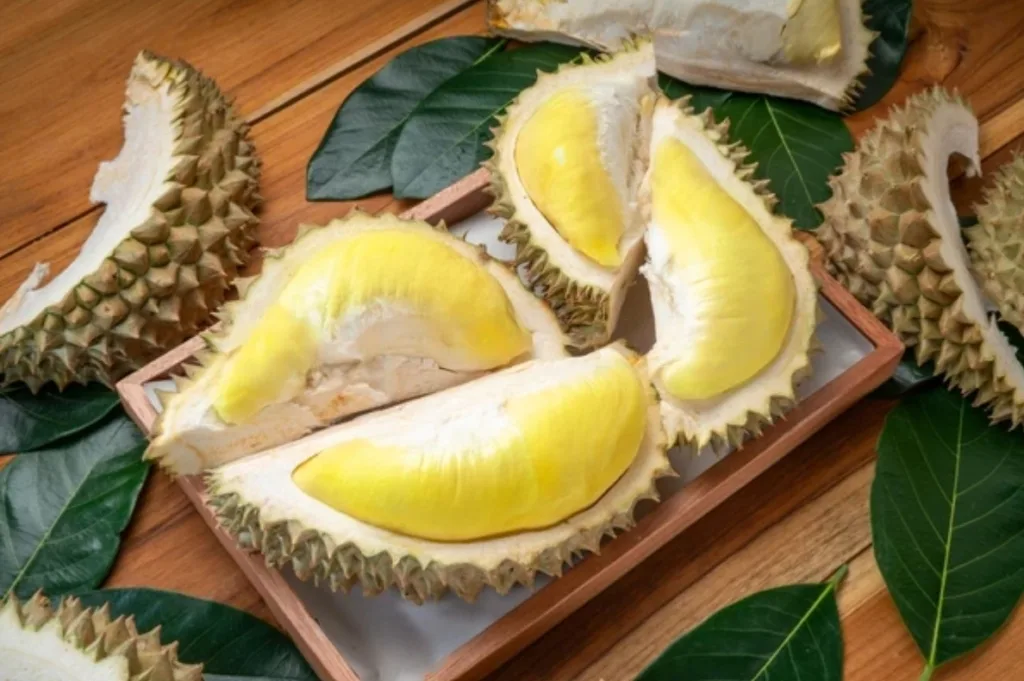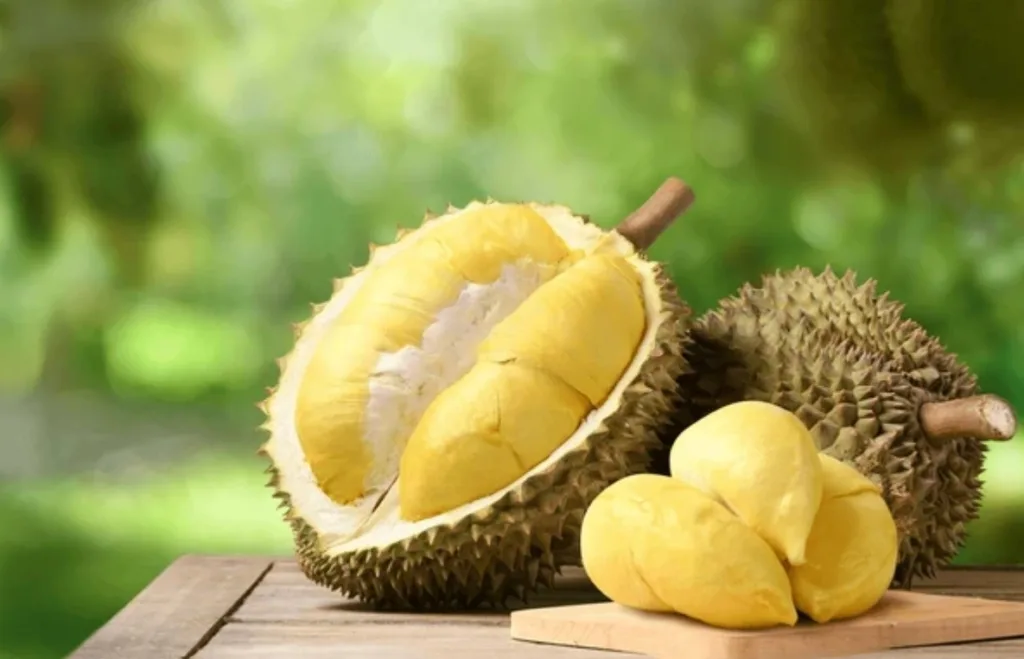What is Durian?
Durian, often called the “king of fruits,” is renowned for its distinctive smell and creamy, rich taste. Despite its polarizing aroma, this tropical fruit is celebrated for its impressive nutritional profile and numerous health benefits. In this article, we will delve into the myriad health advantages and uses of durian, providing a comprehensive guide for those looking to incorporate this unique fruit into their diet.
Nutritional Profile of Durian
Durian is packed with a variety of essential nutrients. A typical serving of durian (approximately 243 grams) contains:
- Calories: 357
- Carbohydrates: 66 grams
- Fat: 13 grams
- Protein: 4 grams
- Fiber: 9 grams
- Vitamin C: 80% of the Daily Value (DV)
- Vitamin B6: 38% of the DV
- Potassium: 30% of the DV
- Manganese: 25% of the DV

Health Benefits of Durian
1. Rich in Antioxidants
Durian is loaded with antioxidants, including vitamin C, polyphenols, and flavonoids. These compounds help neutralize free radicals, protecting the body from oxidative stress and reducing the risk of chronic diseases such as cancer, heart disease, and diabetes.
2. Boosts Immune System
The high vitamin C content in durian strengthens the immune system by promoting the production and function of white blood cells. This enhances the body’s ability to fight against infections and illnesses.
3. Supports Digestive Health
Durian is an outstanding source of dietary fiber, which aids in digestion and prevents constipation. The fiber content also supports the growth of beneficial gut bacteria that contribute to overall digestive health.
4. Improves Heart Health
The potassium in durian helps regulate blood pressure by counteracting the effects of sodium. Additionally, the fruit’s fiber and antioxidant content contribute to lower cholesterol levels, reducing the risk of cardiovascular diseases.
5. Enhances Energy Levels
Durian is rich in carbohydrates, making it a great source of energy. The natural sugars in durian provide a quick energy boost, while its B vitamins support the conversion of food into energy, enhancing overall vitality.
6. Promotes Healthy Skin
The antioxidants and vitamin C in durian play a crucial role in collagen production, promoting healthy, youthful skin. Regular consumption of durian can help reduce the appearance of wrinkles and improve skin elasticity.
7. Supports Bone Health
Durian contains essential minerals such as calcium, potassium, and magnesium, which are vital for maintaining strong and healthy bones. These nutrients help prevent bone-related disorders like osteoporosis.

Uses of Durian in Culinary and Traditional Medicine
1. Culinary Uses
Durian’s unique flavor and creamy texture make it a popular ingredient in various culinary dishes, especially in Southeast Asia. Here are some common uses:
- Desserts: Durian is often used in cakes, ice creams, and pastries. It can be made into durian custard, added to sticky rice, or used to flavor cheesecakes.
- Smoothies and Shakes: Blending durian with other fruits and ingredients creates delicious and nutritious beverages. Durian smoothies often include ingredients like banana, coconut milk, and honey for a rich and satisfying drink.
- Savory Dishes: In some cultures, durian is incorporated into savory recipes like curries and soups. For example, in Indonesia, durian is used to make a savory dish called tempoyak, which is fermented durian mixed with spices and used as a condiment or in stews.
- Snacks and Candies: Durian is also popular in dried form, often used in chips, candies, and pastries. Dried durian retains much of the fruit’s nutritional benefits and can be a convenient snack option.
- Beverages: Durian can be used to make beverages such as durian coffee, durian tea, and even durian wine, providing a unique twist on traditional drinks.
2. Traditional Medicine
Durian has been used in traditional medicine for centuries due to its numerous health benefits. Some traditional uses include:
- Fever Reduction: Durian leaves and roots are used to prepare a decoction that helps reduce fever. The leaves can be boiled and consumed as tea or used in a bath to help bring down body temperature.
- Digestive Aid: Consuming durian helps alleviate digestive issues such as bloating and constipation. The fiber content aids in smooth bowel movements, and the fruit’s natural enzymes assist in digestion.
- Aphrodisiac: Durian is considered a natural aphrodisiac, believed to enhance sexual health and libido. This traditional belief is backed by its rich nutrient content, which supports overall vitality and energy.
- Anti-Inflammatory Properties: The compounds in durian have anti-inflammatory effects, making it useful in traditional medicine for treating swelling and inflammation. Durian pulp and extracts are sometimes used in topical treatments for skin conditions.

How to Select and Store Durian
1. Selecting Durian
When selecting durian, look for the following characteristics:
- Aroma: A strong smell indicates ripeness.
- Shell: The shell should be slightly soft when pressed but not mushy.
- Spikes: The spikes should be firm and widely spaced.
2. Storing Durian
To preserve the freshness of durian, follow these storage tips:
- Refrigeration: Store the whole fruit in the refrigerator for up to five days. If opened, wrap the flesh in plastic wrap and store it in an airtight container.
- Freezing: Durian flesh can be frozen for several months. Place the flesh in a sealed container or freezer bag before freezing.
Potential Side Effects and Precautions
While durian is highly nutritious, it is important to consume it in moderation due to its high calorie and sugar content. Overconsumption can lead to weight gain and spikes in blood sugar levels, particularly in individuals with diabetes.
Additionally, some people may experience allergic reactions to durian. Symptoms may include itching, swelling, and difficulty breathing. If you experience any adverse reactions, discontinue use and seek medical advice.
Conclusion
Durian is a nutrient-dense fruit that offers a plethora of health benefits, from boosting the immune system to supporting heart health. Its unique flavor and versatility make it a valuable addition to both culinary dishes and traditional medicine. By selecting ripe durians and storing them properly, you can enjoy this exotic fruit while reaping its numerous health benefits. Remember to consume durian in moderation to avoid potential side effects and enjoy its benefits to the fullest.
By incorporating durian into your diet, you can experience the powerful nutritional advantages that this tropical fruit has to offer. Whether enjoyed fresh, blended into a smoothie, or used in traditional recipes, durian can be a delicious and healthy addition to your daily routine.
Topics covered
- What is Durian?
- What are key nutrients in Durian?
- What are health benefits of Durian?
- How to use Durian?
- Why is Durian beneficial to health?
- What are side effects of Durian?








1 thought on “Boost Immunity & Heart Health with Durian: A Nutritional Powerhouse”